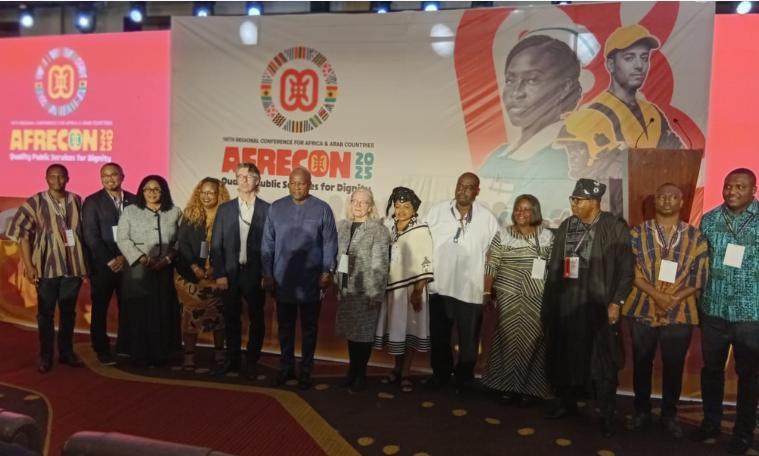Africa-Press – Ghana. Ms Britta Lejon President, Public Service International (PSI) says austerity and exploitation by governments hinder the effectiveness of public services on the African continent.
Ms Lejon, warned that drastic budget cuts and caps on public sector wage bills often implemented by governments were creating a crisis that directly impacted citizens’ access to essential services.
She said this at the 14th African Regional Conference of the Public Service International(PSI) which was held in Accra on the theme, “Quality Public Services for Dignity.”
It underscored the essential role of public sector workers, from healthcare to sanitation, in ensuring that the moral contract between the state and its citizens is upheld.
Africa’s public service space faces many challenges as institutions such as ActionAid reports that Across six African countries, 84 per cent of teachers reported a drop in real income of between 10 per cent and 50 per cent since 2020.
Also, 97 per cent of health workers in these countries described their wages as insufficient to cover basic expenses like rent, food, and household needs.
Austerity is often linked to prioritizing debt repayment, which cuts funds for essential public services, leading to a downsized income for public service workers.
The PSI President pinpointed devastating privatization “tsunami” fueled by austerity measures and the undue influence of international financial institutions and corporate powers.
“Many governments are stuck in financial frameworks that freeze wages, block new recruitment, and push privatisations,” the President stated.
She said, this coupled with endemic corruption, tax evasion, and endless debt, undermined the region’s vast natural resources and capacity to invest in essential services.
The President said treating public services as commodities strips people of their dignity, turning healthcare and clean water into privileges rather than human rights.
She said, “This constant financial strain is felt directly by workers through non-payment of wages, delayed salaries, and the casualization of labour, violating core ILO Conventions.”
The President also highlighted the compounding threat of the climate crisis.
She said the region is marked by severe water and heat stress, with many countries warming twice as fast as the global average.
The PSI President emphasized that a just energy transition is impossible without resilient public services.
“ It is essential to ensure that the rich nations, who cause the majority of global emissions also pay so that the most vulnerable do not bear the most significant burdens,” she said.
The President stressed that the trade union movement was one of the few forces fighting this chaotic reality, demanding fiscal space for investment in welfare, climate adaptation, and secure jobs to ensure people over profit.
For More News And Analysis About Ghana Follow Africa-Press







